
The last few months have been unprecedented difficult times for the hospitality and travel industry employees who were severely impacted. Hotel closures as well as travel halts have naturally forced companies to take measures that have resulted in furloughs, terminations, and salary cuts.
Conventional wisdom holds that “when the going gets tough, the tough gets going” and this might be the perfect time to evaluate the core strength of companies, teams, and individuals.
This presentation summarises the findings of the “HVS Hospitality Executives Sentiment Survey”. The objective of the survey was to understand current employee sentiment, confidence levels, loyalty, and most importantly the current state of mind of the employees’ decision-making process. It is indeed worth evaluating and taking stock of where we stand today and how do we take our most valuable resource forward.
We would like to highlight that this survey is limited to the hospitality executive work-force in the Middle East region. The survey findings confirm and challenge certain current and prevalent beliefs. We would highly recommend that employers and leadership teams engage with their employees to further evaluate and formulate strategies that would help the hospitality sector as it enters the recovery zone.
The survey was carried out between 20-31 May 2020.
Conventional wisdom holds that “when the going gets tough, the tough gets going” and this might be the perfect time to evaluate the core strength of companies, teams, and individuals.
This presentation summarises the findings of the “HVS Hospitality Executives Sentiment Survey”. The objective of the survey was to understand current employee sentiment, confidence levels, loyalty, and most importantly the current state of mind of the employees’ decision-making process. It is indeed worth evaluating and taking stock of where we stand today and how do we take our most valuable resource forward.
We would like to highlight that this survey is limited to the hospitality executive work-force in the Middle East region. The survey findings confirm and challenge certain current and prevalent beliefs. We would highly recommend that employers and leadership teams engage with their employees to further evaluate and formulate strategies that would help the hospitality sector as it enters the recovery zone.
The survey was carried out between 20-31 May 2020.
Question 1: What is your role?
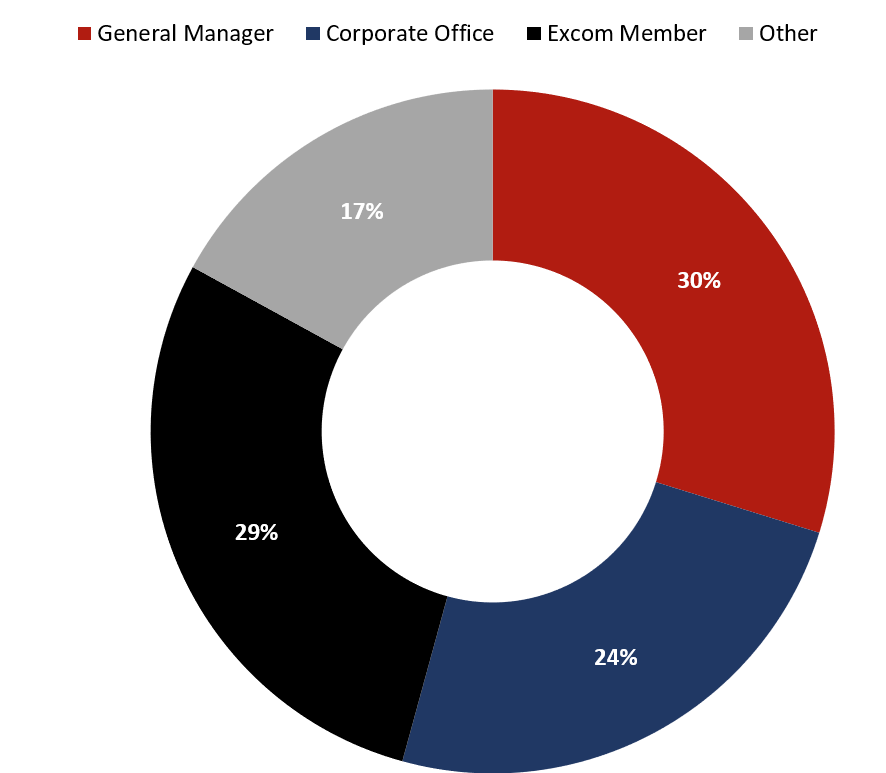 Source: HVS
Source: HVS

The sample data was 100 Hospitality Executives primarily General Managers, Executive Committee members such as Director of Rooms, Executive Chefs, Director of Food and Beverage, and Executive Housekeepers.
Approximately 30% of the respondents surveyed are General Managers of leading hotels in the Middle East region, 29% of the respondents surveyed work as Executive Committee members at unit level, 24% of the respondents surveyed work at hospitality corporate offices primarily in Dubai, and about 17% of the respondents surveyed belong to the other category, such as Learning and Development Managers, Revenue Managers, Sales Managers, and Digital Marketing Managers.
Question 2: Has your employment been impacted by COVID-19?
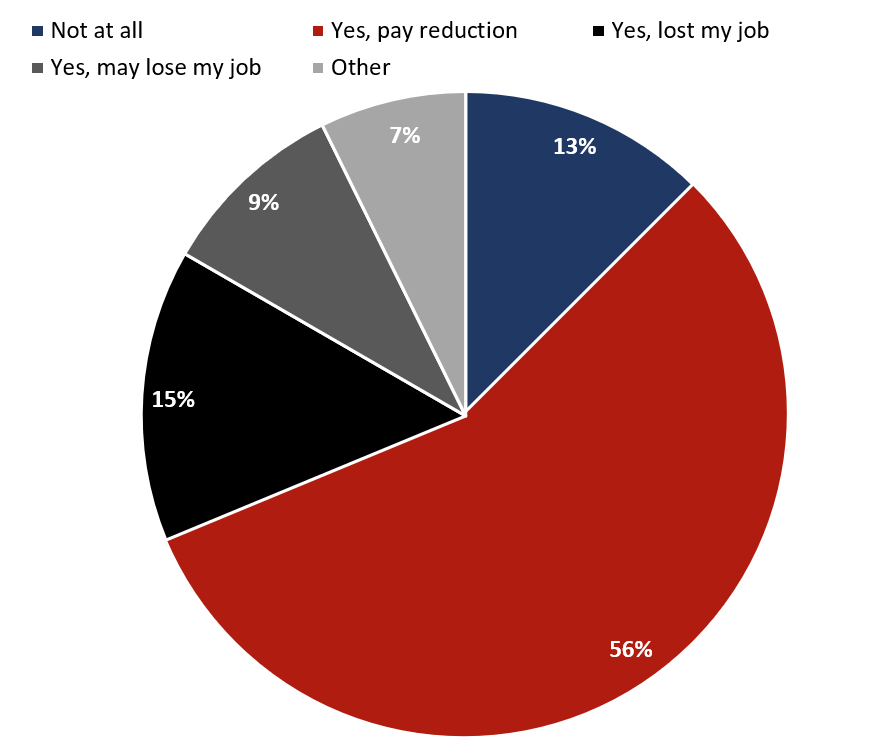 Source: HVS
Source: HVS
Question 3: Do you think you were treated fairly?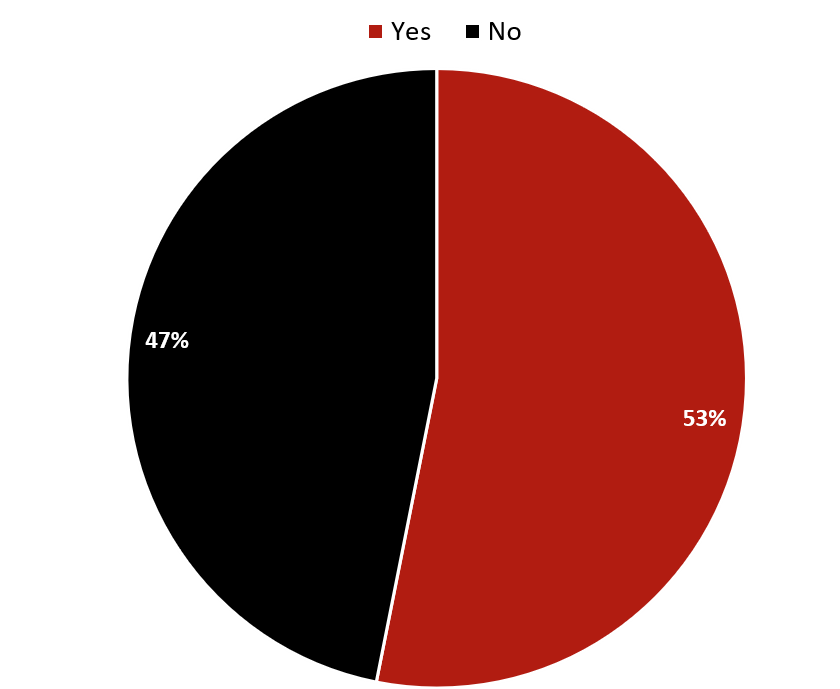 Source: HVS
Source: HVS

Combined, 87% of respondents’ employment was impacted by COVID-19 and approximately 56% of the respondents confirmed that there was a reduction in their salary in the form of monthly cash compensation and/ or allowances.
At the time of survey in end-May 2020, approximately 15% of the respondents confirmed that they had lost their jobs and additional 9% of the respondents were worried that they may lose their jobs. Approximately 7% of the respondents confirmed that they have been put on furlough.
At the time of survey in end-May 2020, approximately 15% of the respondents confirmed that they had lost their jobs and additional 9% of the respondents were worried that they may lose their jobs. Approximately 7% of the respondents confirmed that they have been put on furlough.
Question 3: Do you think you were treated fairly?

This was one of the most impactful findings of the survey. It is interesting and indeed heartening to note that 53% of respondents feel that they were treated fairly although close to 87% of respondent’s employment was impacted. Most employees are cognizant of the fact that hospitality business is amongst the most effected under the current scenario and they would like to be as adaptable as possible.
Most respondents have also commented that they appreciated the transparent and honest communication and were emotionally looked after by their leadership teams. Going forward most employees are watching to see whether their employers and leadership teams would “walk the walk and talk the talk”. The fact that “we are all in this battle together and fighting the same enemy” would ultimately be the key to overcome employee anxiety and dissatisfaction.
Question 4: How loyal do you feel to your current employer?
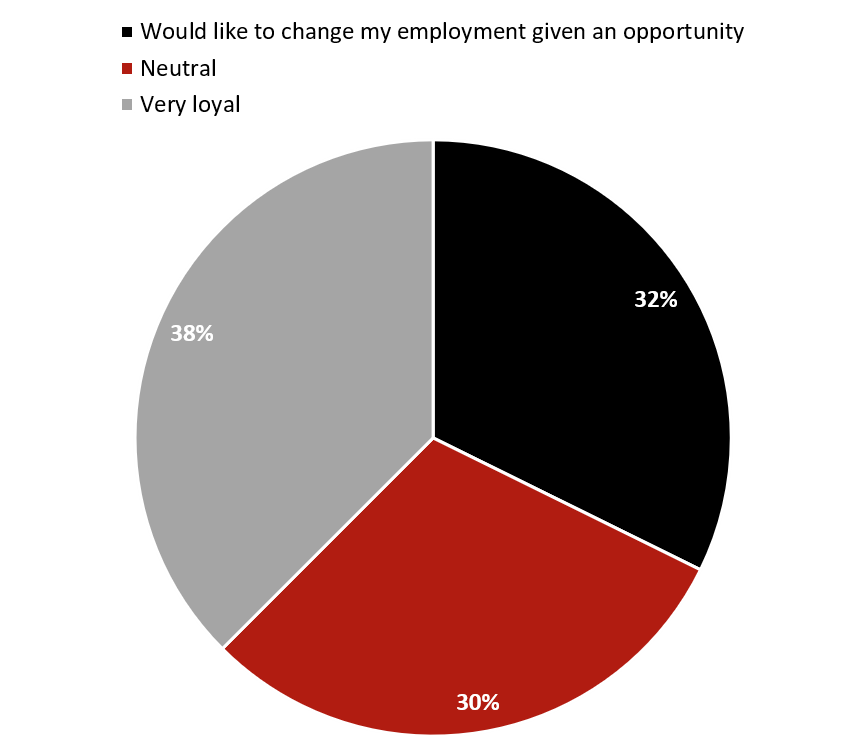
Our survey reflected that combined, 68% of respondents feel a sense of loyalty to their employers. While close to one-third or approximately 32% of the respondents are seeking new opportunities.
About 38% of the respondents feel very loyal towards their current employer which indicates that they are committed in contributing towards successful future business initiatives.
It is our opinion that Leadership and Human Resource teams must work on further improving employee loyalty and act as a catalyst on improving employee morale. The fact that “we are all in this together” would not only foster a sense of “shared ownership” but can make the onward journey easier. Collaborating, engaging and celebrating “small wins” together will all go a long way.
Question 5: During the lockdown period, were you kept engaged/ motivated by your organization?
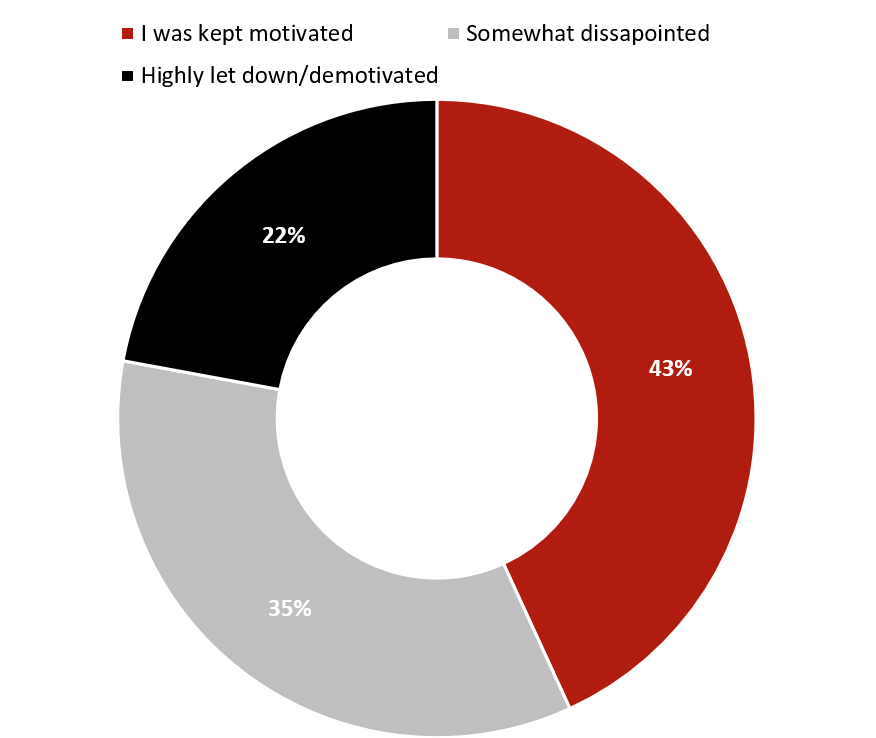
About 43% of the respondents felt that they were kept motivated by their organisations, while clearly the majority of employers, approximately 57%, were totally caught unaware with a lack of a clear sense of direction as to how to manage the employees in this unprecedented situation.
Approximately 22% of the respondents felt highly let down and/or demotivated by their current organisation while close to 35% felt somewhat disappointed or let down by their employers.
As per a recent report in Harvard Business Review,
“Because of reduced travel and better communication tools, many of the C-suite leaders in our study reported greater involvement as teachers and change managers within their organizations. They reported being actively engaged in developing talent and ensuring organizational alignment. Most of the leaders believe that lifelong learning and a growth mindset will be crucial for employees of the future, especially as work continues to move on-line.”
Approximately 22% of the respondents felt highly let down and/or demotivated by their current organisation while close to 35% felt somewhat disappointed or let down by their employers.
As per a recent report in Harvard Business Review,
“Because of reduced travel and better communication tools, many of the C-suite leaders in our study reported greater involvement as teachers and change managers within their organizations. They reported being actively engaged in developing talent and ensuring organizational alignment. Most of the leaders believe that lifelong learning and a growth mindset will be crucial for employees of the future, especially as work continues to move on-line.”
Question 6: How optimistic are you about the recovery in the hospitality sector?
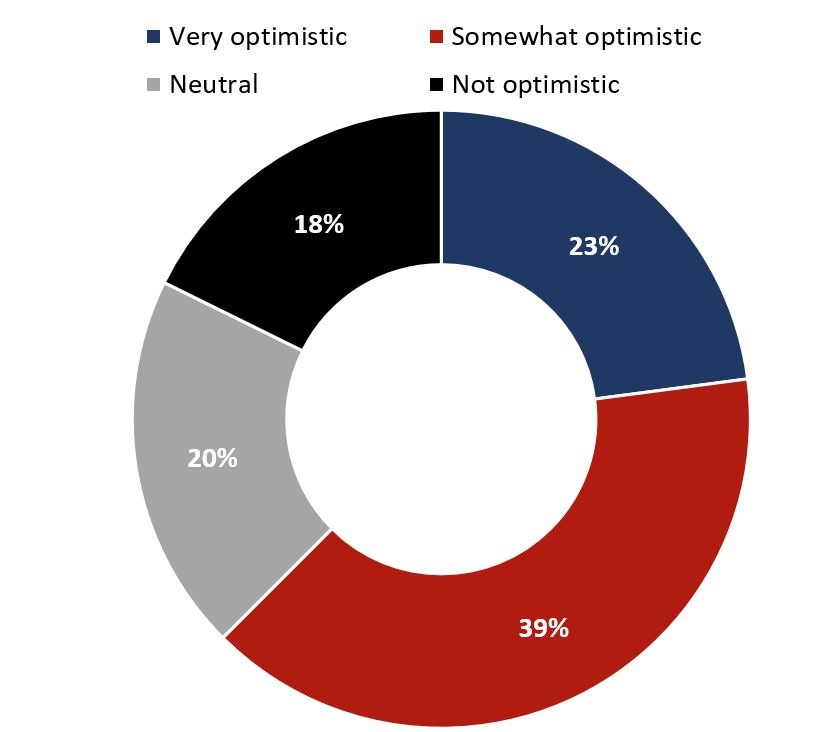 Source: HVS
Source: HVS
.png) Source: HVS
Source: HVS
The fast-changing nature of business today requires the hospitality industry to enhance their capabilities and indicates that employees’ retraining would be imperative for organizations to survive and eventually succeed.
Close to 97% of respondents acknowledge the same and have confirmed that they would require to retrain in order to be completely on-board and be fully prepared to successfully face the challenge that lies ahead.
The prevailing sentiment to this question is that 94% of the respondents would like to reskill themselves in the near future. This clearly suggests an immediate need that has to be addressed. This could be an area that could compensate a furlough, or a pay cut to an employee. For instance, An Executive Chef can reskill and multi-task as Head of Food Production and Services after a period of comprehensive training.
Sales and Marketing professionals would certainly need to to train in digital marketing and revenue management. Some jobs could be virtually managed such as Marketing, Revenue Management, Reservations and Accounting. Remote working was rarely practiced or supported in the hospitality sector in the pre-pandemic era. Many employees would require training to be effective at their new self-supervised work from home job roles.
“Employers would need to encourage a results and outcome focused approach over the traditional presence-driven model”
Question 10: What are the key challenges that lie ahead?.png) Source: HVS
Source: HVS

Close to 60% of the respondents are optimistic about the recovery in the hospitality sector.
23% of the respondents are very optimistic, while close to 40% are somewhat optimistic about the recovery and immediate future of the sector.
Approximately 18% of the respondents are not optimistic about the future and are likely to look for an alternate career or opportunities in alternate industries in near future.
23% of the respondents are very optimistic, while close to 40% are somewhat optimistic about the recovery and immediate future of the sector.
Approximately 18% of the respondents are not optimistic about the future and are likely to look for an alternate career or opportunities in alternate industries in near future.
Question 7 & 8: Do you consider your team will require retraining to adapt to the new norm? What are they key trainings that you are currently looking to roll out?
.png)
The fast-changing nature of business today requires the hospitality industry to enhance their capabilities and indicates that employees’ retraining would be imperative for organizations to survive and eventually succeed.
Close to 97% of respondents acknowledge the same and have confirmed that they would require to retrain in order to be completely on-board and be fully prepared to successfully face the challenge that lies ahead.
Key Training Needs highlighted: Health and Hygiene, Digital Marketing, Virtual Operations, Training Teams, Improving staff morale. “It would be now critical to note how hospitality companies and their teams function in the face of an unprecedented global pandemic while also navigating an accelerated shift to remote and digital operations.”
Question 9: In the “new-normal” and post COVID-19, if given an opportunity would you like to retrain/ reskill yourself?
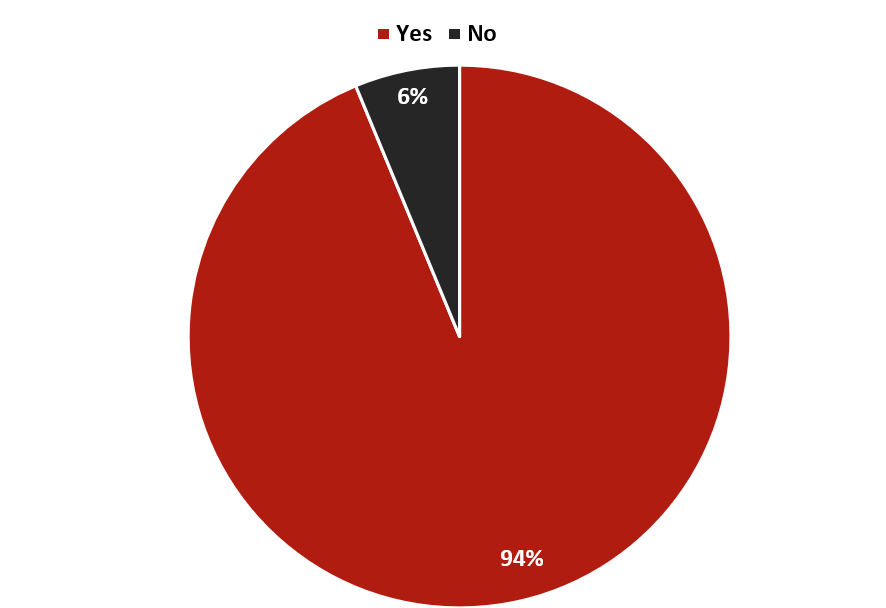 Source: HVS
Source: HVS

The prevailing sentiment to this question is that 94% of the respondents would like to reskill themselves in the near future. This clearly suggests an immediate need that has to be addressed. This could be an area that could compensate a furlough, or a pay cut to an employee. For instance, An Executive Chef can reskill and multi-task as Head of Food Production and Services after a period of comprehensive training.
Sales and Marketing professionals would certainly need to to train in digital marketing and revenue management. Some jobs could be virtually managed such as Marketing, Revenue Management, Reservations and Accounting. Remote working was rarely practiced or supported in the hospitality sector in the pre-pandemic era. Many employees would require training to be effective at their new self-supervised work from home job roles.
“Employers would need to encourage a results and outcome focused approach over the traditional presence-driven model”
Question 10: What are the key challenges that lie ahead?
.png)
The pandemic has not only shaken the hospitality industry but has also posed serious challenges for the future pertaining mainly to regaining guest confidence, as stated by 77% respondents.
As health and safety have become major concerns, hotels will need to find new ways to ensure both guest safety (60%), as well as the safety of employees (70%). Other internal challenges that hotels will need to face are hiring (27%) and training (29%).
An external challenge that hotels will need to face and adapt to are government regulations, based on 49% of respondents, and the new policies that they put in place to ensure that social distancing is practiced, and curfews are adhered to. This will in turn hugely impact the hotel’s occupancy rates and their amenities, as well as their F&B outlets.
As health and safety have become major concerns, hotels will need to find new ways to ensure both guest safety (60%), as well as the safety of employees (70%). Other internal challenges that hotels will need to face are hiring (27%) and training (29%).
An external challenge that hotels will need to face and adapt to are government regulations, based on 49% of respondents, and the new policies that they put in place to ensure that social distancing is practiced, and curfews are adhered to. This will in turn hugely impact the hotel’s occupancy rates and their amenities, as well as their F&B outlets.
Question 11: Given the state of hospitality, how soon do you think that people would be ready to travel again?
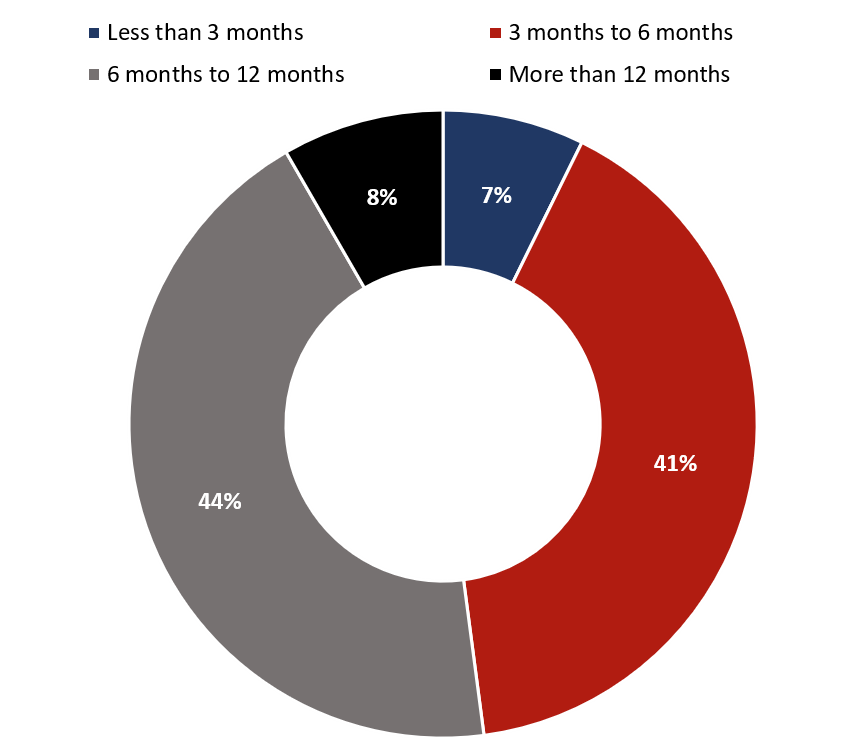 Source: HVS
Source: HVS
Even as governments start to ease restrictions locally, and people feel a sense of boredom, fear is still instilled in people and dominates their behavioral patterns.
Only 7% of respondents are ready to travel in less than 3 months, while the majority of respondents would either wait for 3 to 6 months (41%) and even more so, 44% would be willing to travel in 6 to 12 months.
Only 8% of people would still feel unsafe to travel before one year.
Question 12: Would you be willing to work on a reduced pay in the next 6 months should that be the case?.png) Source: HVS
Source: HVS
75% of employees would be willing to work on a reduced pay for the upcoming 6 months, as opposed to 25% who would refuse a deduction in their salary.
With an ongoing challenge, not only affecting one industry, or even one country, most employees realize that a salary cut is the more secure option at this point in time.
Employee loyalty, the fear of the unknown and the unclear timeline as to when they will be able to find another job during these difficult times, play a big role in an employee’s decision to compromise and settle.
Question 13: Are there any other benefits that you would seek from your employer against the pay deduction?.png) Source: HVS
Source: HVS
Question 14 : Would you prefer to relocate to your home country?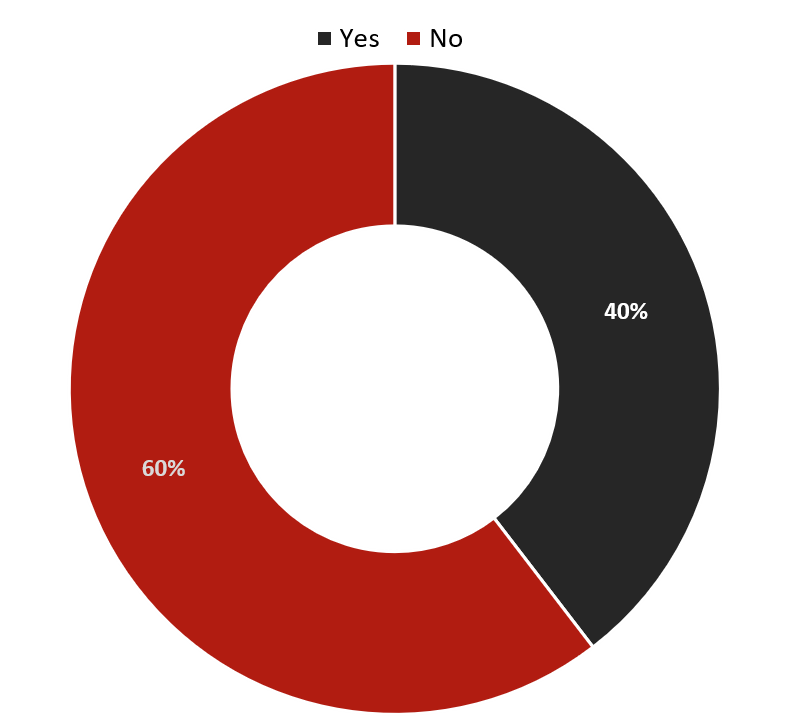 Source: HVS
Source: HVS
Clearly, most of the employees, approximately 60% of the expat workforce would prefer to continue to stay in the region rather than relocating back to their home countries. The reasons are career and financial aspirations.
It is also heartening to note that the recovery in the region both from COVID-19 and its financial implications could be much faster than the rest of the world. While about 40% of the respondents would prefer to relocate back to their home country as most certainly those employees who have lost their jobs would not be able to sustain themselves in the region over the coming weeks or months.
“Here in the UAE, since it is heavily dependent on expat community towards workforce, post-C19 situation there might be a heavy shortage of employees as many of front-line staff have expressed desire to return to their home countries as regulation get lifted. The best possible solution is to retain existing team members, furloughed them until signs of reopening are visible. Tough times & trying times ahead! All the best!” - Quote from one of the respondents in the survey.

Even as governments start to ease restrictions locally, and people feel a sense of boredom, fear is still instilled in people and dominates their behavioral patterns.
Only 7% of respondents are ready to travel in less than 3 months, while the majority of respondents would either wait for 3 to 6 months (41%) and even more so, 44% would be willing to travel in 6 to 12 months.
Only 8% of people would still feel unsafe to travel before one year.
Question 12: Would you be willing to work on a reduced pay in the next 6 months should that be the case?
.png)
75% of employees would be willing to work on a reduced pay for the upcoming 6 months, as opposed to 25% who would refuse a deduction in their salary.
With an ongoing challenge, not only affecting one industry, or even one country, most employees realize that a salary cut is the more secure option at this point in time.
Employee loyalty, the fear of the unknown and the unclear timeline as to when they will be able to find another job during these difficult times, play a big role in an employee’s decision to compromise and settle.
Question 13: Are there any other benefits that you would seek from your employer against the pay deduction?
.png)
The survey revealed several positive point of views. While 75% of the respondents are open to a pay-cut, they would value certain benefits.
58% of the respondents voted training in other verticals or training for multi-skilling as a key benefit. Higher Education for some key employees could benefit the employer and the employees in the very near future. This could also be effectively used to retain furloughed employees.
63% of the respondents consider that insurance (life and health insurance) would be critical going forward. Clearly, this is the need of the hour?
17% of the respondents suggested that additional meals or meal allowance could be provided by the employers.
ESOPs and performance linked bonus are amongst the other benefits suggested by the respondents.
58% of the respondents voted training in other verticals or training for multi-skilling as a key benefit. Higher Education for some key employees could benefit the employer and the employees in the very near future. This could also be effectively used to retain furloughed employees.
63% of the respondents consider that insurance (life and health insurance) would be critical going forward. Clearly, this is the need of the hour?
17% of the respondents suggested that additional meals or meal allowance could be provided by the employers.
ESOPs and performance linked bonus are amongst the other benefits suggested by the respondents.
Question 14 : Would you prefer to relocate to your home country?

Clearly, most of the employees, approximately 60% of the expat workforce would prefer to continue to stay in the region rather than relocating back to their home countries. The reasons are career and financial aspirations.
It is also heartening to note that the recovery in the region both from COVID-19 and its financial implications could be much faster than the rest of the world. While about 40% of the respondents would prefer to relocate back to their home country as most certainly those employees who have lost their jobs would not be able to sustain themselves in the region over the coming weeks or months.
“Here in the UAE, since it is heavily dependent on expat community towards workforce, post-C19 situation there might be a heavy shortage of employees as many of front-line staff have expressed desire to return to their home countries as regulation get lifted. The best possible solution is to retain existing team members, furloughed them until signs of reopening are visible. Tough times & trying times ahead! All the best!” - Quote from one of the respondents in the survey.
Question 15: Would you like to suggest anything for the overall benefit of the hospitality employees in the Middle East region?
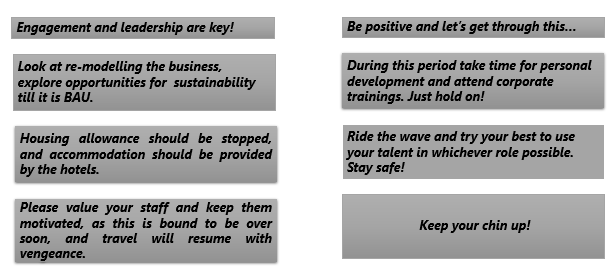
Source: HVS

Source: HVS
Author’s Note
Nobody is saying it is going to be easy. The way forward to rebuild and realign the hospitality industry would require “all hands on deck” and the support, intellect, and hard work of the employees.
Hospitality industry employees have been amongst the most severely impacted of all industries and seek out strong leadership support. There is an immediate need for transparent, constant and clear communication, engagement and collaboration, training to improving hygiene and safety standards, training to reskill, and, most importantly, rebuilding confidence.
The survey results highlight that most hospitality industry employees in the region continue to stay positive, flexible, and loyal and are willing to press the restart button with courage and confidence. It is now over to the employers to outline a clear, cohesive, and capable plan in place.
Disclaimer
HVS does not provide legal or other regulated advice or guarantee results. The survey findings reflect general insight based on information available to us by the participants. These findings should be viewed as indicative only and not relied upon for future course of action. These findings may be subject to change and therefore HVS has no obligation to update these findings and makes no representation or warranty and expressly disclaims any liability with respect thereto.
Hospitality industry employees have been amongst the most severely impacted of all industries and seek out strong leadership support. There is an immediate need for transparent, constant and clear communication, engagement and collaboration, training to improving hygiene and safety standards, training to reskill, and, most importantly, rebuilding confidence.
The survey results highlight that most hospitality industry employees in the region continue to stay positive, flexible, and loyal and are willing to press the restart button with courage and confidence. It is now over to the employers to outline a clear, cohesive, and capable plan in place.
Disclaimer
HVS does not provide legal or other regulated advice or guarantee results. The survey findings reflect general insight based on information available to us by the participants. These findings should be viewed as indicative only and not relied upon for future course of action. These findings may be subject to change and therefore HVS has no obligation to update these findings and makes no representation or warranty and expressly disclaims any liability with respect thereto.
About Bhavna Bhatia
Bhavna Bhatia is the Vice President of HVS Executive Search and leads the practice for the Middle East and Africa region. Bhavna is an experienced Executive Search and Hospitality professional with more than two decades of demonstrated expertise in the IMEA region.
Over the last fourteen years that she has been with HVS, Bhavna has successfully engaged in several senior executive hires and C-level mandates. She has also managed mid-level recruitments and placed pre-opening teams in the Middle East, Africa, and India. Bhavna is skilled in providing advisory executive search support for start-ups in the hospitality, healthcare, real estate, and entertainment sector. For more information contact Bhavna at [email protected].
Over the last fourteen years that she has been with HVS, Bhavna has successfully engaged in several senior executive hires and C-level mandates. She has also managed mid-level recruitments and placed pre-opening teams in the Middle East, Africa, and India. Bhavna is skilled in providing advisory executive search support for start-ups in the hospitality, healthcare, real estate, and entertainment sector. For more information contact Bhavna at [email protected].

Great article Bhavna. Well researched and very relevant data for hospitality leaders in the Middle East.
Thank you very much, Court.